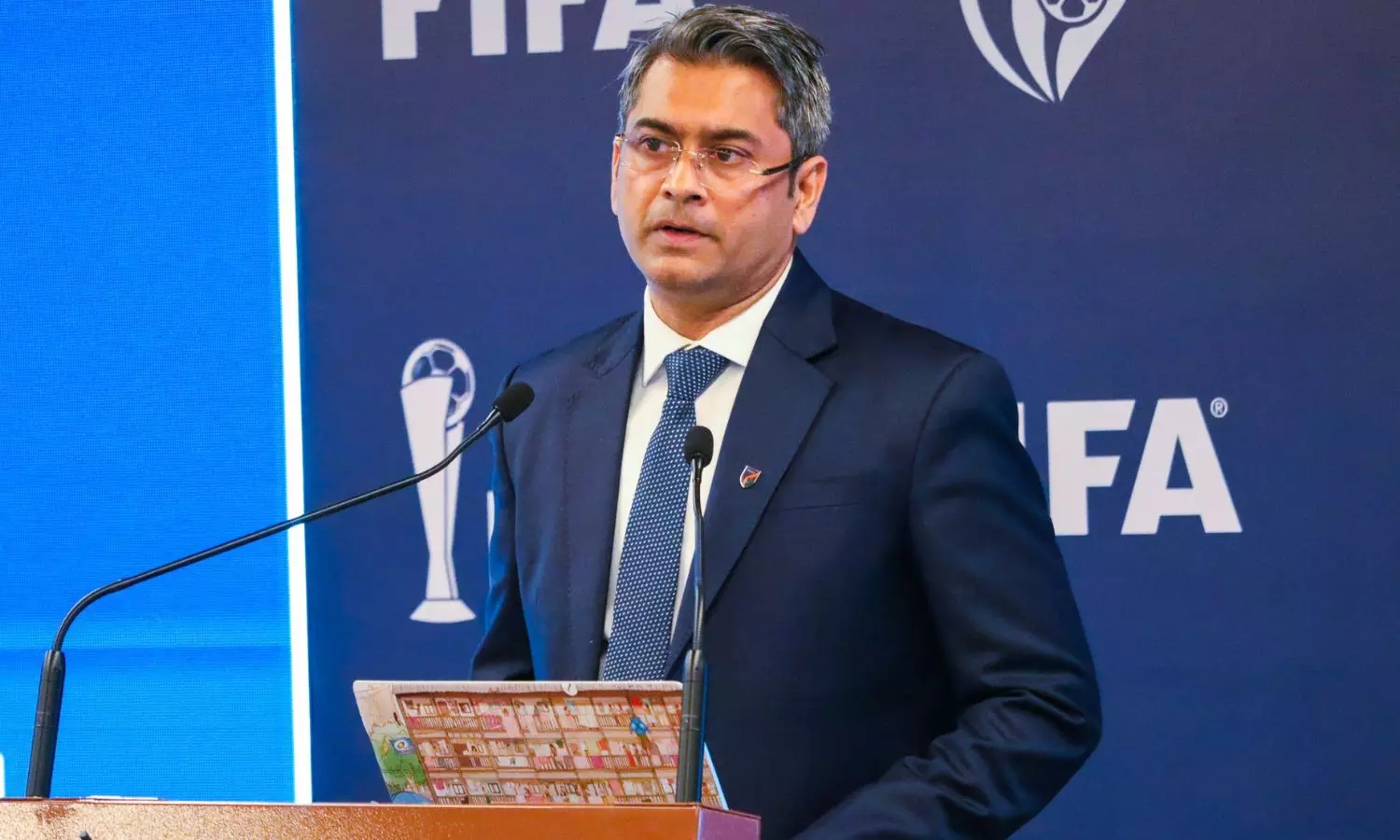Football
Explained: Legal Head raises alarming issues in letter to President Kalyan Chaubey
Nilanjan Bhattacharjee's letter to AIFF's president highlights systemic failures, including lack of consultation, delayed payments, and disregard for legal advice, jeopardizing the organization's integrity and financial stability.

Kalyan Chaubey became the AIFF president in September 2022. (File Photo)
The head of AIFF's legal wing, Nilanjan Bhattacharjee, has penned a letter to President Kalyan Chaubey, shedding light on critical issues plaguing the organization. The letter addresses various concerns, ranging from salary discrepancies to questionable decisions impacting AIFF's reputation and financial stability.
Nilanjan Bhattacharjee has not minced words in highlighting pressing concerns crucial for both his family's survival and the sustenance of AIFF. Despite relentless follow-ups, the letter reveals a lack of redressal from the recipient's office, exacerbating the situation.
One of the major grievances raised by Nilanjan is the absence of consultation on legal matters concerning AIFF, despite holding the position of Nodal legal officer. He claims that contracts are neither vetted nor signed by him, leading to privacy breaches and legal complications.
However, Kalyan Chaubey responded to the email from nodal legal officer, Nilanjan Bhattacharjee, by stating, "We receive a lot of mails, the concerned department will pick and address it. In any case, the allegations of termination of services and holding back retainership, if at all, is a matter for HR dept. and not President’s office." This response was reported by TOI.
Let's take a look at the key concerns highlighted in the letter:
1. Writ Petition Dr. Shaji Prabhakaran vs Union of India:
The letter claims that AIFF was served the petition just two days before the court granted an ex-parte stay (a decision made without hearing from all parties involved). As a part of the AIFF legal team, weren't informed about the petition or given any chance to respond in court. Nilanjan believes that if they had known about the petition earlier and been present in court, they could have helped AIFF better.
2. Official Partnership with IndiGo:
Nilanjan, deeply familiar with AIFF's standard procedure for reviewing and approving agreements, was taken aback when the draft agreement with IndiGo was shared only after the partnership had been publicly announced. This procedural deviation left the legal team with no opportunity to provide input or advice on the terms beforehand, a departure from established protocol.
Upon reviewing the draft agreement, they discovered what they considered to be unfavorable terms for AIFF, notably a significant financial commitment with limited potential returns. Recognizing the potential risks this posed to AIFF's financial stability, he immediately raised their concerns with Dr. Prabhakaran.
Despite their efforts, no changes were made to the agreement, and they found themselves under pressure from higher-ups to approve it as it stood. Firm in their conviction that consenting to the agreement would expose AIFF to undue financial risk, Nilanjan refused to give his consent, a decision that was met with backlash.
In addition to professional challenges, he also faced personal attacks aimed at coercing them into agreeing to the deal. These attacks caused him significant distress and discomfort.
3. Tendering Process of the I-League:
In the past, concerning irregularities were noted in the execution of production for previous I-League matches, including allegations of using dummy cameras, raising concerns about the integrity of the broadcasting process.
To address these issues, Nilanjan, in collaboration with Dr. Shaji Prabhakaran, proposed measures to enhance oversight and prevent such occurrences in the future. This included appointing AIFF officials to monitor inventory during matches and suggesting the implementation of blacklisting norms akin to those utilized by Central Public Sector Undertakings (PSUs) to deter frivolous litigations from disgruntled vendors.
However, these proactive steps were met with disapproval from the recipient's office, who failed to implement the proposed blacklisting norms and expressed dissatisfaction to other members of AIFF.
Regrettably, Nilanjan's attempts to protect AIFF from potential risks were misconstrued as "dilatory and delaying tactics," leading to public comments aimed at tarnishing their character and integrity.
4. Appointment of Personnel on AIFF Rosters:
Personal recommendations and interference compromised operational efficiency and financial prudence.
Nilanjan's efforts to streamline operations and minimize costs were met with resistance, highlighting systemic issues in personnel management and decision-making.
The engagement of additional personnel based on personal recommendations without considering operational requirements adds unnecessary financial burden and undermines organizational efficiency.
5. Reimbursement for Expenses:
Nilanjan highlights the concerning issue of the President's office using their account to book multiple tickets and hotels, yet failing to reimburse them for these expenses. Furthermore, electricity payments made for personnel associated with the recipient's office remain unpaid, adding to the financial burden.
These expenses were incurred before the current President assumed office, emphasizing the longstanding nature of the outstanding dues. Nilanjan asserts that he has meticulous records of all such transactions and are willing to provide evidence if necessary for reimbursement.
The non-payment of dues has placed significant financial strain on the Nilanjan, making it challenging for him to support their family.
6. Non-payment of longstanding dues of lawyers:
The writer underscores the significance of goodwill in the legal profession, where lawyers often extend credit, trusting their dues will be paid in time. Despite facing heightened litigation, AIFF reduced legal costs during the writer's tenure.
Personally taking steps to streamline legal matters, including closing unnecessary cases and scrutinizing invoices, they made efforts to minimize expenses. However, substantial dues to AIFF's lawyers persist, despite their diligent representation, including before the Hon'ble Supreme Court of India.
The writer expresses concern over the potential damage to the legal team's reputation due to non-payment. Urgently requesting prompt settlement of these dues, they emphasize the importance of preserving AIFF's integrity and honoring commitments to its legal team.
